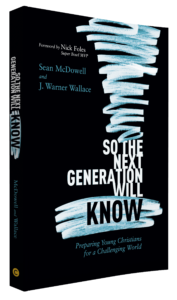
Response #1:
“Are you sure? Is that statement objectively true? If there are no objective truths, then the statement, ‘There are no objective truths,’ can’t be objectively true. Do you see the problem? As it turns out, all of us accept some objective truth claims, just as you do when you claim, ‘There is no objective truth.’ The only thing left, then, is to decide which claims are objectively true and which are simply a matter of personal opinion. Have you ever considered the claims Christians make about God? Do you think these kinds of claims are objective or subjective?”
If there are no objective truths, then the statement, ‘There are no objective truths,’ can’t be objectively true. Do you see the problem? Share on X
OR
Response #2:
“There are two kinds of truth claims: objective and subjective. Objective claims are grounded in objects, subjective claims are grounded in subjects (individuals). When I say chocolate chip cookies are the best cookies, that’s simply my personal, subjective opinion. But when I say Isoniazid is the cure for Tuberculosis (TB), that truth is more than simply my opinion. It is grounded in the object known as Isoniazid. That drug either cures TB or it doesn’t, and my opinion doesn’t make it true or false. To say that ‘there are no objective truth claims,’ is to deny this claim about Isoniazid. Have you considered how dangerous that approach would be?”
There are two kinds of truth claims: objective and subjective. Objective claims are grounded in objects, subjective claims are grounded in subjects (individuals). Share on X


J. Warner Wallace is a Dateline featured Cold-Case Detective, Senior Fellow at the Colson Center for Christian Worldview, Adj. Professor of Christian Apologetics at Talbot School of Theology, Biola University, author of Cold-Case Christianity, God’s Crime Scene, and Forensic Faith, and creator of the Case Makers Academy for kids.
Subscribe to J. Warner’s Daily Email
J. Warner Wallace is a Dateline featured cold-case homicide detective, popular national speaker and best-selling author. He continues to consult on cold-case investigations while serving as a Senior Fellow at the Colson Center for Christian Worldview. He is also an Adj. Professor of Christian Apologetics at Talbot School of Theology, Biola University, and a faculty member at Summit Ministries. He holds a BA in Design (from CSULB), an MA in Architecture (from UCLA), and an MA in Theological Studies (from Gateway Seminary).




































